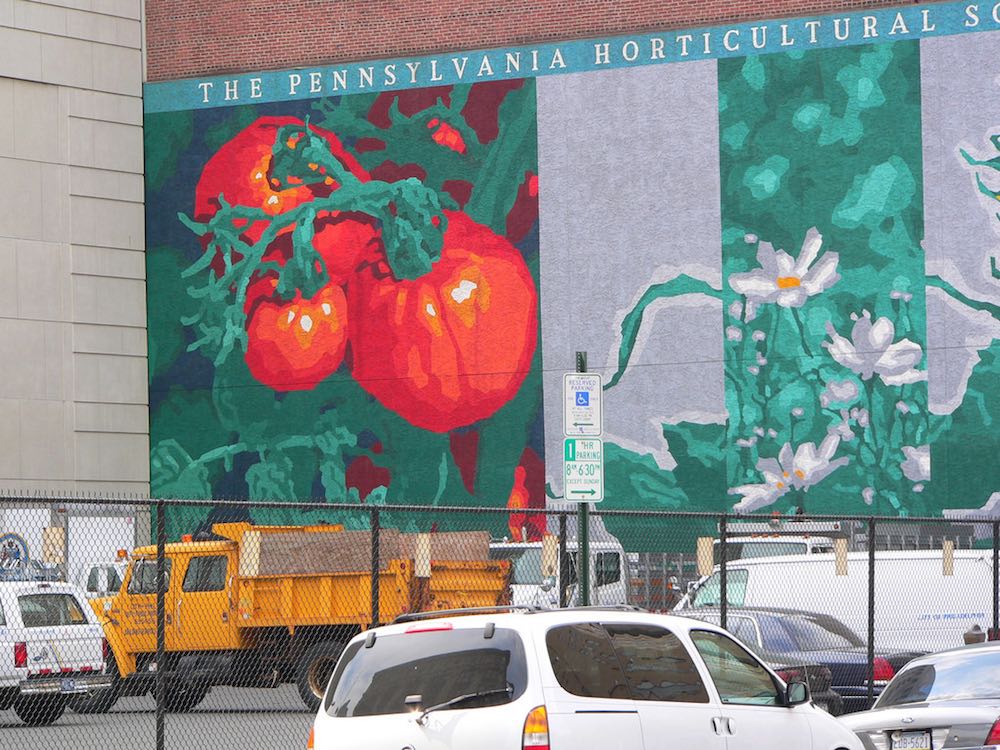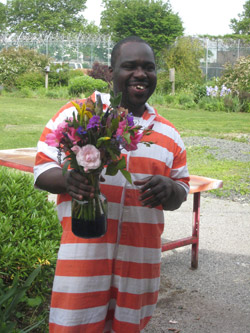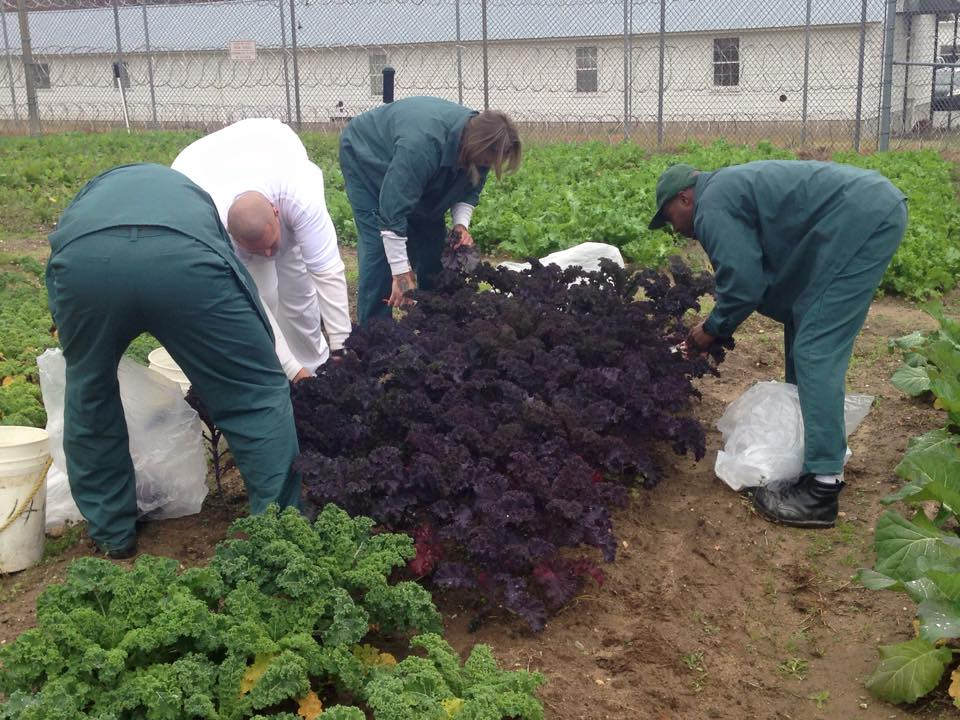In 2008, the Pew Center on the States reported that Vermont, Michigan, Oregon, Connecticut, and Delaware spent more money on prisons than on higher education, and the ratio of prison to education spending was increasing. Prisons receive billions of dollars each year in government funding, yet national recidivism (rearrest) rates continue to hover at around 66 percent. Following the economic recession, budgets have been slashed, forcing penitentiaries and post-release programs to cut spending.
Considered non-essential and expensive, prison garden programs are often the first to be cut. Yet they have proven to be successful in not only reducing recidivism rates and improving rehabilitation, but also providing fresh healthy food to inmates and surrounding communities. The following are just several of many initiatives around the country that demonstrate what these kinds of gardening programs can accomplish.
Sandusky County Jail Gardening Program

Started in 2009, the 11,706 square-foot Sandusky County Jail garden in Ohio originally began as a way to cut costs and still provide food for the inmates. It soon became obvious, however, that beyond its economic benefit, inmates were provided with a program that taught them valuable life lessons and career-building skills.
“They really learn a skill out of this,” said program coordinator Jim Seaman. “It gives them a sense of something that they have accomplished. Now they are starting to get a chance to taste their hard work.”
Sheriff Kyle Overmyer estimates that the program saved his department more than $25,000 in 2009. Because the 1.5-acre garden sometimes produces more than the jail can use, he said the sheriff’s office donated about 375 pounds of produce to local food pantries and soup kitchens in 2010. In addition to producing pumpkins, raspberries, and other fruits and vegetables, the program has raised broiler chickens, which are consumed on site. “We raised 100 broilers last year [2010] and had 600 pounds of meat after.”
From our partners:
Further success can be seen in the lowered recidivism rate among inmates who participate in the program. According to Seaman, compared to the general Sandusky County Jail inmate population, which has a recidivism rate of 40 percent, only 18 percent of inmates who participate in the garden program are rearrested.
Roots to Re-Entry
Launched in 2006, the Roots to Re-Entry program is a partnership between the Pennsylvania Horticulture Society, the City of Philadelphia, and other private institutions around the city. The garden is tended by roughly two-dozen inmates for several hours during the week, providing seedlings and organic produce for community gardeners, local food pantries, and soup kitchens.

“We produce thousands and thousands of pounds of food for donation,” says Sharat Somashekara, city gardens coordinator for the Pennsylvania Horticultural Society, which helped establish the program through its Philadelphia Green program. “Our whole garden is managed organically,” he adds. “We build the soil, we compost, we cover crop—we even make our own cayenne pepper spray [a natural pesticide].” The program gives inmates a chance to develop new skills, gain hands-on landscaping experience, and pursue meaningful employment upon their release.

Roots to Re-entry is unique in its level of integration with other environmental initiatives across the city. Besides teaching inmates job skills, the program has distributed 47,000 pounds of organic produce to needy families. Inmates have raised thousands of seedlings that are distributed to 42 community gardens participating in the Philadelphia Horticultural Society’s City Harvest program. The resulting produce is donated to local food pantries operated by a local nonprofit called SHARE, which gives the produce to low-income residents along with the Health Promotion Council, an organization that holds nutrition education classes for vulnerable and at-risk populations.
“It’s a beautiful thing to plant something and see it grow,” said inmate Larry Brand. “It makes me feel like I’m giving back for some of the things I did wrong.”
GreenHouse

Started in 1996, GreenHouse is a garden program designed to rehabilitate convicts in Rikers Island, New York City’s main jail complex. With a greenhouse, a classroom, and over 2.5 acres of landscaped and productive gardens designed and built by inmates, participants receive applied skills, including woodworking and learning how to build planters, as well as job counseling from the program. Each year about 125 inmates participate. Once released, GreenHouse offers 9-12 month paid internships as part of the Green Team, where individuals maintain gardens at public libraries and in other spaces throughout the city, earning $7 to $10 an hour.
The recidivism rate for graduates of the program is 5 to 10 percent, compared to 65 percent for the general inmate population. Some GreenHouse alumni find permanent jobs with landscaping companies, receiving salaries as high as $30,000 per year. The Green Team has been an active organization in New York City bringing gardens to public schools all over the city. They helped put a garden at the Walt Whitman Library in Brooklyn.
Insight Garden Program
Developed in 2003 in collaboration with San Quentin State Prison in California, the Insight Garden Program (IGP) provides rehabilitation to self-selected prisoners through organic gardening. Inmates learn valuable life skills, including responsibility, discipline, mindfulness, and how to effectively work in a group setting.

The IGP’s classes include course curricula and hands-on experience in a 1,200 square foot organic flower garden in San Quentin’s prison yard. Inmates learn about landscaping and gardening, developing practical skills in planting, irrigation, propagation, budgeting, and design. By working in an organic flower garden, participants develop an awareness of their impact on their social and natural environment.
A 2004 thesis written by a student from Pepperdine University found that the prison garden program was beneficial in several key ways, including providing focused activity, a sense of refuge, stress reduction, and a safe, neutral territory in an otherwise divisive prison yard.
Currently, Planting Justice teaches a course on urban permaculture and organic food production to the 30 men enrolled in the IGP course, involving inmates in the planning, design, implementation, and maintenance of their native plant and flower garden. In 2010, Planting Justice hired a former convict and participant in the garden.
The Garden Project

In 1982, while working at the San Francisco County Jail as an inmate counselor, Catherine Sneed and Sheriff Michael Hennessey began the Horticulture Project as a way to teach life lessons and skills to inmates through organic vegetable gardening.
Recognizing the need for a program to help former offenders confront challenges and difficulties post-release, Catherine Sneed began The Garden Project in 1992 with a mission to provide job training and support to ex-inmates through counseling and assistance in continuing education. Since its inception, the Garden Project has become a flagship program for successful post-release rehabilitation and fostering positive relations with the communit
Former inmates are employed at The Garden Project’s 12-acre organic farm, which includes a number of environmental maintenance and urban restoration projects. In addition to its career-building and counseling programs, the project also helps their employees attain their GED and attend courses at local community colleges. Food grown at the farm is donated to local food banks, helping seniors and families in local communities.
By 2002, The Garden Project had employed more than 4,300 ex-prisoners and served thousands of incarcerated men and women, teaching them essential job and life skills and providing literacy courses and computer training. According to San Francisco County Sheriff Mike Hennessy,
“The Garden Project is a tremendously effective crime-prevention program. It not only helps individuals rebuild their lives, but recidivism studies we’ve conducted also show that while 55 percent of our prisoners are rearrested within a year, those who go through the Garden Project have a recidivism rate of 24 percent, and that’s after two years.”
The Garden Project has expanded its assistance programs outside U.S. borders.
This feature originally appeared in Worldwatch Institute.

















